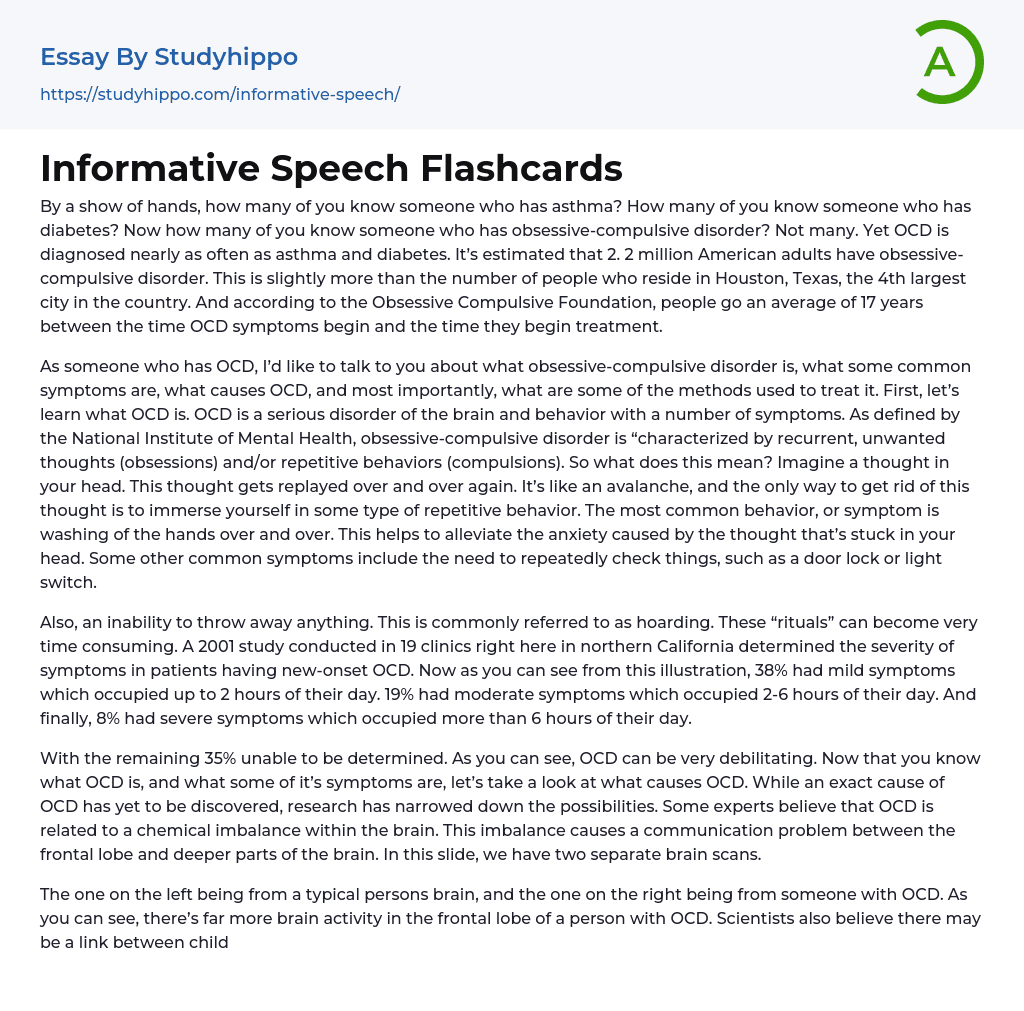Do you know anyone with asthma or diabetes? How about someone with obsessive-compulsive disorder (OCD)? Although it is rare to know someone with OCD, this condition is diagnosed at the same rate as asthma and diabetes. In fact, approximately 2.2 million adults in America have OCD, which slightly surpasses the population of Houston, Texas - the fourth largest city in the country. The Obsessive Compulsive Foundation states that there is typically a 17-year gap between when OCD symptoms begin and when treatment starts.
Obsessive-compulsive disorder (OCD) is a brain and behavior disorder characterized by the recurring presence of unwanted thoughts (obsessions) and repetitive behaviors (compulsions). The individuals affected experience these obsessions repeatedly, leading to feelings of anxiety. To alleviate this anxiety, they frequently engage in repetitive actions such as handwashing or constant checking of locks or switches.
...According to the National Institute of Mental Health, OCD is a significant condition that necessitates exploration of different treatment approaches.
Hoarding, the inability to discard items, is a time-consuming behavior commonly known as hoarding. A study conducted in 2001 at 19 clinics in northern California investigated the severity of symptoms in patients with new-onset OCD. The accompanying visual representation demonstrates that 38% of individuals had mild symptoms, requiring up to 2 hours of their daily routine. Moderate symptoms were reported by 19% of participants and took up 2-6 hours per day. Finally, severe symptoms affected 8% of subjects and occupied more than 6 hours of their daily activities.
OCD is highly disabling because it is difficult to determine the remaining 35%. However, research has narrowed down potential reasons for OCD despite not having identified an exact cause yet. One theory suggest
that OCD is connected to a chemical imbalance in the brain, which impacts communication between the frontal lobe and deeper brain regions. The following slide presents two separate brain scans.
The left image displays the brain activity of an average individual, whereas the right image exhibits brain activity in someone with OCD. Individuals with OCD demonstrate increased brain activity in the frontal lobe. Researchers suggest a potential link between childhood strep throat episodes and the onset of OCD. This is due to antibodies combating strep throat possibly affecting neural communication in the brain, leading to challenges. It is crucial to acknowledge that this cause is presently under debate and investigation.
When it comes to the seriousness of OCD, there are available treatment options. Currently, various experimental treatments are being tested, but experts generally agree on two main approaches for treating OCD.
The first approach is cognitive-behavioral therapy (CBT). CBT is a type of psychotherapy that focuses on replacing problematic patterns of thinking with more beneficial ones. For example, an individual with OCD who has a fear of germs might be exposed to a dirty room and prevented from washing their hands, aiming to develop new coping mechanisms that don't involve engaging in compulsive rituals.
The second approach is medication. Antidepressants are commonly prescribed for treating obsessive-compulsive disorder. These medications affect the brain's serotonin levels, which impact mood and anxiety. Popular antidepressants used include Prozac, Paxil, and Zoloft.
When individuals are given a combination of medications and behavioral therapy, most experience a significant reduction in symptoms, and some even achieve complete recovery. Recently, it has been discovered that a considerable number of people suffer from obsessive-compulsive disorder (OCD), which could potentially
affect future generations. Thankfully, there are various evolving treatment options available. While I am unsure if I will ever fully overcome the effects of OCD, I now understand its nature and know how to take measures towards managing it.
- Cloning essays
- Medical Ethics essays
- Patient essays
- Therapy essays
- drugs essays
- Cannabis essays
- Aspirin essays
- Cardiology essays
- Hemoglobin essays
- Pharmacology essays
- Surgery essays
- alternative medicine essays
- Plastic Surgery essays
- Organ Donation essays
- Vaccines essays
- Medical essays
- Dentist essays
- Psychological Trauma essays
- Physical therapy essays
- Cold essays
- Cocaine essays
- Why Marijuana Should Be Legalized essays
- Drug Abuse essays
- Teenage Drug Abuse essays
- Heart Disease essays
- Artery essays
- Learning Disability essays
- Bipolar Disorder essays
- Dyslexia essays
- Major Depressive Disorder essays
- Mental Disorder essays
- Adhd essays
- Anxiety essays
- Depression essays
- Psychosis essays
- Schizophrenia essays
- Antisocial Personality Disorder essays
- Stress essays
- Suicide essays
- Mental Illness essays
- Depression And Anxiety essays
- Insanity essays
- Tension essays
- Suicide Prevention essays
- John Locke essays
- 9/11 essays
- A Good Teacher essays
- A Healthy Diet essays
- A Modest Proposal essays
- A&P essays




